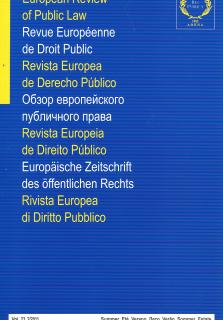
Administrative Law / Droit administratif
France
Pascale Gonod
As far as administrative organisation is concerned, past months attest the progression and the adjustment of territorial reforms of decentralisation, and are mostly marked by the institution of the Defender of rights, created through the constitutional revision of July 23, 2008, which was realised after long debates. Administrative justice remains at the heart of legislative reforms, subject to debate because of the profound modifications they intend to bring to the contentious administrative procedure. Moreover, the Council of State had to rule on the impartiality of administrative judges. Several cases have dealt with the hierarchy of norms, especially as far as the application and interpretation of supra-national law is concerned. The jurisdictional judge (juge des conflits) has thus sanctioned an “abuse of legislative power” by refusing to apply a law granting jurisdiction on the basis of the European Convention on Human Rights; the Council of State renounced the prejudicial question to the Minister of Foreign Affairs concerning the interpretation of an international convention. In its opinion of March 21, 2011, it has also estimated that it is to the national court to guarantee the effectiveness of the rights that every person is entitled to through the obligation of the State consisting in transposing Community directives into domestic law under both the treaty and the Constitution; it has confirmed its classic case law regarding judicial review of international conventions. The judge has also intervened regarding liability by creating a new positive application of no-fault liability of the State because of international conventions, and by admitting a new case in which the inaction of the Administration, even without fault, may be a source of liability for breach of equality before public burdens. In the domain of contract litigation, an important case has led to a specification of the qualification criteria of public service delegation and of the contract of occupation of a public domain dependence.
S’agissant de l’organisation administrative, les mois écoulés attestent de la progression et de l’ajustement des réformes territoriales de décentralisation, et sont surtout marqués par l’institution du Défenseur des droits née de la révision constitutionnelle du 23 juillet 2008, qui se concrétise après de longs débats. La justice administrative demeure au cœur des réformes législatives, sujettes à débats en raison des profondes modifications qu’elles entendent apporter à la procédure administrative contentieuse. Par ailleurs, le Conseil d’Etat a eu à statuer sur l’impartialité des juges administratifs. Plusieurs affaires ont été retenues au titre de la hiérarchie des normes, et plus particulièrement concernant l’application et l’interprétation du droit supra-national. Le juge des conflits a ainsi sanctionné un “détournement de pouvoir législatif” en refusant d’appliquer une loi d’attribution de compétence en se fondant sur la Convention européenne des droits de l’homme; le Conseil d’Etat a renoncé à la question préjudicielle au ministre des Affaires étrangères en matière d’interprétation d’une convention internationale. Dans son avis du 21 mars 2011, il a par ailleurs estimé qu’il revient au juge national de garantir l’effectivité des droits que toute personne tient de l’obligation que constitue pour l’Etat la transposition en droit interne des directives communautaires tant en vertu du traité que de la Constitution; il a confirmé sa jurisprudence classique en matière de contrôle juridictionnel des conventions internationales. Le juge est également intervenu en matière de responsabilité en faisant une nouvelle application positive de la responsabilité sans faute de l’Etat du fait des conventions internationales, et admettant un nouveau cas dans lequel l’inaction de l’Administration, même non fautive, peut être source de responsabilité pour rupture de l’égalité devant les charges publiques. Dans le domaine du contentieux contractuel, une importante affaire a conduit à préciser les critères de qualification de la délégation de service public et du contrat d’occupation d’une dépendance du domaine public.





















